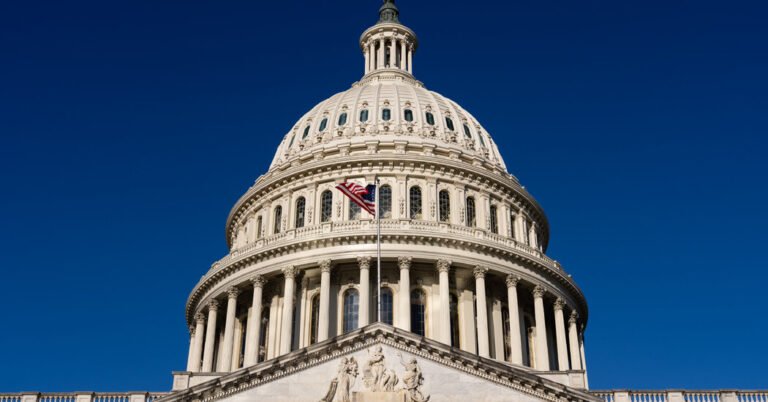This page will be updated as more decisions are released and changes are made to the rejected provisions.
The bill carrying much of President Trump’s domestic agenda is facing examination by the Senate parliamentarian, a nonpartisan official who enforces the chamber’s complex rules — and who can effectively strip out parts of the bill that don’t comply.
Republicans will be able to push the tax and entitlement package through with a simple Senate majority, avoiding a Democratic filibuster, as long as it complies with the “Byrd Rule,” which has governed the budget reconciliation process they are using since the 1980s. Under the rule, each of the bill’s provisions:
-
Must produce a non-incidental change to the federal budget. In other words, it must primarily be a change to spending or revenue. Provisions with no or minimal budgetary impact, or that are mostly there for policy reasons, are supposed to be struck, but the decision can be subjective.
-
May not increase the deficit outside of the budget window. In this case, provisions can’t add to deficits past 2034.
-
May not make changes to Social Security.
The process of review is known informally in the Senate as the “Byrd bath.” So far, the parliamentarian, Elizabeth MacDonough, has determined that dozens of provisions do not pass muster to be included in the megabill, in most cases because they represent policy changes with only incidental effects on the budget.
Republican committee leaders have said they plan to rewrite some of the struck provisions to make them compliant.
Rejected provisions
Most of the struck provisions would have had a small effect on the bill’s bottom line, with some exceptions. Others were policy priorities for some Republicans, and their removal could make those lawmakers less enthusiastic about supporting the bill. What is likely to be the most consequential ruling, on whether Republicans may use a budget maneuver to exclude the cost of tax cut extensions, is still outstanding.
We’ve highlighted instances where Republicans have said they have made or are working on adjustments to the offending portions.
Food benefits
SNAP state matching funds
After the provision was rejected, Republicans said that they revised the language to comply with the rules. Democrats will have the opportunity to review the change and challenge it.
SNAP eligibility for certain immigrants
Limit food aid benefits to citizens or lawful permanent residents, with certain exceptions
Permanent price support authority
A legislative mechanism usually addressed in the Farm Bill to prevent old agricultural laws from taking effect
Immigration and justice
State and local immigration enforcement
Funding for states to conduct border security and immigration enforcement
Republicans are working to adjust this provision to make sure it complies with the rules.
State and local law enforcement grant eligibility
Limit eligibility for grants for “sanctuary” jurisdictions, or if the attorney general disagrees with how states and localities enforce immigration policies
State and local authority to arrest noncitizens
Authority for state and local officials to arrest noncitizens suspected of being unlawfully present in the U.S.
Limitation on lawsuits against the federal government
Limit on preliminary injunctions or temporary restraining orders by requiring litigants to post potentially large bonds. This provision could have limited those seeking to block President Trump’s executive actions.
Limitation on the ability of the government to settle with third parties
Energy and environment
Repeal of green energy and emissions reduction programs
The parliamentarian ruled that the bill may take away funding from Inflation Reduction Act programs, but it may not repeal their authorization, so Congress could provide funding to them in the future.
Repeal of E.P.A. tailpipe emissions rule
Repeal of an E.P.A. regulation limiting vehicle emissions
Environmental reviews
A provision would have allowed project sponsors to expedite environmental reviews and avoid judicial scrutiny for a fee. The judicial review portion was found to violate the rules.
Environmental compliance
Automatic compliance with the National Environmental Policy Act for oil and gas lease sales
Geothermal leasing and royalties
Requirement for annual geothermal lease sales and changes to geothermal royalties
Mining road in Alaska
Approval for construction of the Ambler Road
Natural gas exports and imports
Fee for natural gas exporters to have their project “deemed to be in the public interest” and approved
Offshore oil and gas leasing
Requirement that leases be issued within 90 days of a sale
Public land sales
Mandatory sales of Bureau of Land Management and U.S. Forest Service land to allow for more housing
Renewable energy fees
Removal of the Interior secretary’s discretion to reduce fees for solar and wind projects on public land
Banking and financial regulation
Elimination of Consumer Financial Protection Bureau funding
Elimination of the Office of Financial Research funding
The office is an independent bureau that is supposed to monitor risk on Wall Street
Elimination of the Public Company Accounting Oversight Board
The board is an auditing watchdog created after the 2001 Enron scandal
Reduction in pay of some Federal Reserve employees
Federal workers and government
Limits on agency rulemaking
A version of the REINS Act, which would give Congress more power over federal agency rules
Agency reorganization
Authorization for the executive branch to reorganize federal agencies
Retirement contributions and worker protections
Increase in the rate of required contributions to the federal retirement system for those who do not give up some civil service protections
Cost-cutter bonuses
Incentive program for federal employees to identify expenditures to cut
Worker complaints
Requirement that workers and former workers pay filing fees when they make complaints
Electric U.S.P.S. vehicles
Requirement that electric vehicles used by the Postal Service are sold
Fees for unions
New fee for federal worker unions’ use of agency resources
Other
Defense spending plan enforcement
Reduction in appropriations if Defense Department spending plans are not submitted on time
Coast Guard station repair
The section in violation would apply to a specific damaged station on South Padre Island, Texas
NASA space vehicle transfer
Transfer of space shuttle to a nonprofit in Houston from the Smithsonian’s National Air and Space Museum
